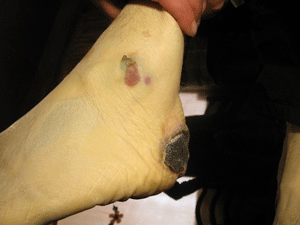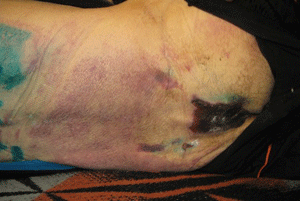“What have they done to make my lower limbs paralyzed?” Nadim Tsetskhladze died in Gldani prison.
Saba Tsitsikashvili, Gori
After the war in August of 2008 finished he decided to visit his pregnant wife at home; however, the commander did not allow him to go. Nadim Tsetskhladze did not pay attention to his order, took off his uniform and went to the village to see his new-born child. Criminal case was launched against him for leaving the military unit in Batumi. 30-year-old Nadim Tsetskhladze surrendered to the law enforcement officers on September 6, 2009. He was born in the village of Mejvriskhevi in Gori district in 1979. Nadim Tsetskhladze served in Batumi military battalion for one year. During the August war he was fighting at the entrance to Tskhinvali.

Dead Prisoner Has Trace of Torture on the Body
“We informed our son that his wife was going to deliver a child. The commander refused him to go home. He got angry, took off his uniform and left the unit. He was arrested for it. Initially we paid bail of 5 000 GEL; then they offered us plea-bargain. Gori district prosecutor’s office agreed to cancel imprisonment liability at all and leave only suspended sentence and bail of 5 000 GEL which we had already paid. However, penitentiary department requested to leave him in prison for at least one year. Why, what was the purpose?! I will do my best to find out the truth and will not forgive it anybody,” said the father of the dead prisoner Shota Tsetskhladze.
On March 5, human rights defender Nana Kakabadze reported that a prisoner was in poorest conditions in Geguti Prison N 8. On the same day, wife of Tsetskhladze petitioned to the public defender of Georgia.
On March 12, lawyer Gela Nikolaishvili and Dachi Tsaguria gave a press-conference on the fact. After that, on March 12, Nadim Tsetskhladze was taken to the national center for tuberculosis from the jail hospital. Despite all these efforts, it turned out impossible to help the prisoner. The only “relief” for him was to place him in ordinary hospital.
“The police detained completely healthy man; he was very educated and tried to be a successful lawyer… we cannot imagine how he could die within 5 months,” the neighbors are worrying.
After the health conditions became extremely critical Nadim Tsetskhladze was taken to the national center of tuberculosis. “What have they done with me to make my lower limbs paralyzed!?” it is the only phrase the relatives remember from Nadim when he was in very bad conditions already. Other details are unclear. The prisoner could not speak and perceive the surrounding environment.
The dead prisoner was taken to the settlement of the poultry factory in Mejvriskhevi village after the death. His widow Eka Tabukashvili said her husband died at 3:00 am on March 13. The human rights defenders Nana Kakabadze and Dachi Tsaguria condoled with the family in the village.
“You helped us much and struggled much for us but we could not help him; anyway, with your support he died in our presence,” the relatives of the dead young man told Nana Kakabadze in Mejvriskhevi.
Shota Tsetskhladze, the father: “On February 10, 2010 I personally visited my son in Geguti prison and he was healthy. We conversed almost 20 minutes. After that, I visited the prison on February 22 but could not meet him. Prison personnel told me he was taken to Tbilisi jail hospital in very poor conditions on February 11. I was very surprised because I had seen my son on the previous day and he was healthy. On February 23 I arrived in Tbilisi but was not allowed to see my son in the jail hospital. On February 24 I arrived in Tbilisi again and petitioned to the parliament and jail hospital. I had to get the reply from 10:00 am to 1:00 pm next day but I arrived in the jail hospital only at 2:00 pm. I could not meet the prison administration. I decided to petition to Chkadua – one of the officials at the  penitentiary department. I was told at the hospital that I had to take the letter to the department personally and to hand it there. However, Chkadua refused to meet me. Finally, one of the employees of the chancellery dared to enter his office and Chkadua called the director of jail hospital who told him Nadim Tsetskhladze was unconscious. I was allowed to visit my son in two days – on February 27 but I could not see him. I arrived in Tbilisi on February 28 and saw my son. He had a new walking stick and was lying in clean linen. But when we visited him on March 4, my son was lying in wet linen because of the moisture, he was already putrefied. It was evident that he had his ankles and waste broken; he was in terrible conditions. On March 5, with the support of Nana Kakabadze everybody learned what was going on.”
penitentiary department. I was told at the hospital that I had to take the letter to the department personally and to hand it there. However, Chkadua refused to meet me. Finally, one of the employees of the chancellery dared to enter his office and Chkadua called the director of jail hospital who told him Nadim Tsetskhladze was unconscious. I was allowed to visit my son in two days – on February 27 but I could not see him. I arrived in Tbilisi on February 28 and saw my son. He had a new walking stick and was lying in clean linen. But when we visited him on March 4, my son was lying in wet linen because of the moisture, he was already putrefied. It was evident that he had his ankles and waste broken; he was in terrible conditions. On March 5, with the support of Nana Kakabadze everybody learned what was going on.”
On March 5Nana Kakabadze started to urge the government to take all measures to assist Nadim Tsetskhladze. She publicly announced on March 17 – a day before his death – that the prisoner is dying. “We request the public defender to visit Nadim Tsetskhladze immediately and to find out the situation. According to his family members, his life is in danger and the prison administration does not do anything to take the prisoner to the city hospital where doctors could provide proper medical treatment for him.”
However, at 3:00 am on March 18 the prisoner died. His family members and relatives were with him in the national center of tuberculosis. In the medical history of the dead prisoners it was the only exception when the prisoner died in the presence of his relatives.
Reportedly, one more prisoner died who was sitting in the same cell as Tsetskhladze. He was resident of Mejvriskhevi village too. The dead prisoner – Kekelishvili was taken to the village on February 21. The Tsetskhladzes learned that their son was in poor conditions on that day. According to the spread information, Tsetskhladze and Kekelishvili were beaten together and one of them died immediately.
“We learned about poor health conditions of Nadim on February 21 when Kekelishvili was brought to the village. They were together in the same cell,” said Shota Tsetskhladze.



